Delhi, the capital city of India, holds the Indian Parliament, the Supreme Court of India, Intelligent Bureau (IB), RAW, CBI, Delhi Police, CRPF, CISF, and various security agencies. However, it has also earned the infamous title of being the crime capital of India, witnessing numerous heinous crimes such as rape, murder, gang wars, acts of modesty against women, smuggling, terrorism, politically and religiously sponsored communal riots, daylight robbery, anti-India movements, dacoities, snatching, pickpocketing, instances of public indecency on public transport buses, forced marriages, and illegal or forced religious conversions.
This bustling metropolis, with its diverse population and vibrant culture, unfortunately experiences a high incidence of criminal activities that plague its streets. Delhi faces the harsh reality of numerous crimes occurring within its boundaries. These include rape, murder, gang wars, acts of modesty against women, smuggling, terrorism, politically and religiously sponsored communal riots, daylight robbery, anti-India movements, dacoities, snatching, pickpocketing, instances of public indecency on public transport buses, forced marriages, and illegal or forced religious conversions.
The prevalence of such crimes highlights the significant challenges and safety concerns faced by the city. Despite the presence of security agencies and law enforcement bodies, these criminal activities raise questions about the effectiveness of existing measures in maintaining law and order and ensuring the safety of Delhi’s residents and visitors.
The severity and frequency of crimes in Delhi have overshadowed the city’s other achievements and contributions. It is crucial for authorities, policymakers, and society as a whole to acknowledge and address these issues directly, working towards creating a safer and more secure environment for all.
Given the diverse range of crimes and their complexities, comprehensive efforts are required to tackle the underlying social, economic, and cultural factors that contribute to Delhi’s high crime rate. Strengthening law enforcement, implementing effective preventive measures, fostering community engagement, and promoting awareness and education about crime prevention are vital steps towards ensuring the well-being and security of Delhi’s residents.
In this context, it becomes imperative to delve deeper into the factors that contribute to Delhi’s reputation as the crime capital of India, analyze the existing systems, and explore potential solutions that can transform the city into a safer and more secure place for its inhabitants.
Rape incidents:
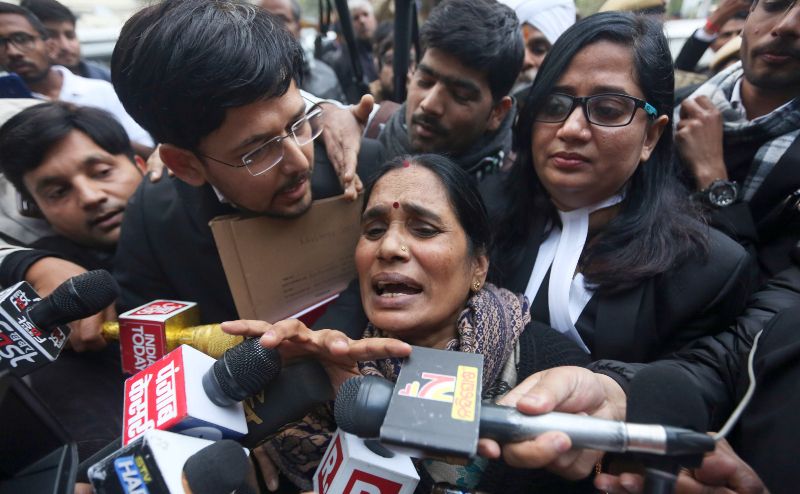
Landmark verdict: Supreme Court of India orders January 22 hanging of four men convicted in the horrific 2012 gang rape on a moving bus
Delhi has witnessed numerous rape incidents in the last few decades. The most heinous rape incident reported in Delhi was the 2012 Delhi gang rape and murder. In this case, a group of men in a moving bus brutally assaulted and raped a young woman. The incident sparked widespread outrage and protests throughout the country, as people demanded justice for the victim and stricter laws to address the issue of sexual violence.
The victim tragically succumbed to her injuries, further fueling public anger. As a result of this incident, significant changes were made to India’s legal framework, with amendments implemented to strengthen laws against sexual offenses and enhance the safety and security of women in the country.
However, even after these amendments, Delhi continues to report similar incidents. According to an article published in the Indian Express, at least six rape cases are reported every day. In the year 2022, the Police data recorded over 1,100 rapes.
Murder incidents:
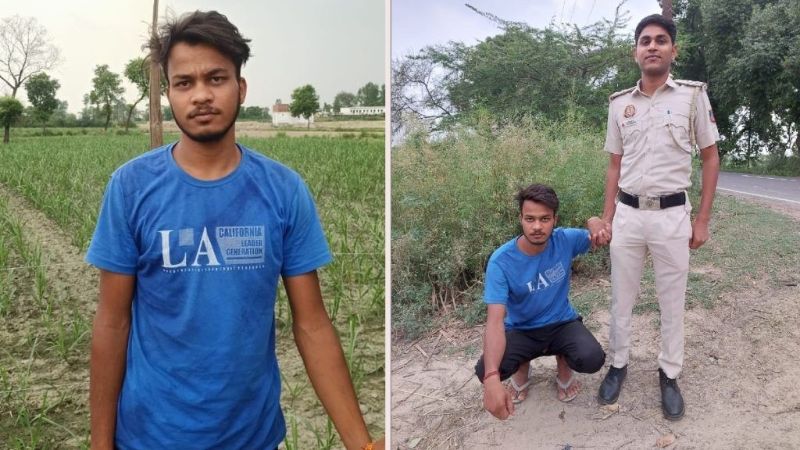
Arrested: UP Police apprehends Sahil Khan, the suspect accused of stabbing a 16-year-old girl
In May 2023, a 20-year-old boy named Sahil Khan stabbed a 16-year-old girl in Delhi, inflicting 21 stab wounds and brutally attacking her with a stone in broad daylight and in the presence of bystanders. The entire incident was captured on CCTV footage. Following the crime, political parties engaged in the common practice of playing the blame game. The Women’s Commission and the Police promptly took notice of the crime and apprehended the accused from a neighboring state.
Another distressing incident occurred on June 22nd, 2023, when three men attacked a 72-year-old woman near the Mandawali railway under-bridge, adjacent to Preet Vihar. They mercilessly stabbed her at least 50 times using ice picks with the intention of seizing her property. The police acted swiftly and arrested four individuals involved in the incident from a neighboring state.
On June 24th, 2023, The Hindu newspaper reported a case of double murder in RK Puram. Two sisters were tragically killed, and the police apprehended nine individuals in connection with the crime.
Gang-war:

CCTV footage captures clash between rival gangs in northeast Delhi’s Jafrabad
A clash between two rival gangs in northeast Delhi’s Jafrabad recently resulted in injuries to four men. CCTV cameras captured the incident, which showed three alleged members of the Nasir gang firing upon their rivals from the Chhenu gang on Monday night.
The injured individuals, identified as Sameer Khopad, Abdul Hasan, Arbaaz, and his brother Hamza, have been admitted to a hospital. Hamza is currently in critical condition, as they all sustained gunshot wounds in various parts of their bodies, including the waist, hip, back, and chest.
Abdul Nasir heads the Nasir gang, which has been engaged in a long-standing rivalry with Irfan, also known as Chhenu Pehalwan, the leader of the Chhenu gang. Both gangs operate in the trans-Yamuna area, and their feud originated in 2010 as they competed for dominance in the region and ran illegal betting operations. Unfortunately, this ongoing enmity has already claimed the lives of more than a dozen individuals.
Although the police refrain from categorizing the incident as a “gang war,” they suspect that it stems from personal enmity between the involved parties. Sandhya Swami, the Additional Deputy Commissioner of Police, stated that they are investigating all angles.
CCTV footage revealed a group of four men engaged in a conversation on the street. Soon after, three armed individuals arrived at the scene and opened fire on the seated men. The footage captured one person, who was sitting on a bike, collapsing, while the others were pursued and shot at. After the perpetrators unleashed a barrage of gunfire, they fled the scene.
According to the police, five criminals were likely involved, with three conducting reconnaissance while the remaining two waited nearby.
Investigations are currently underway, with the police determined to apprehend and bring the culprits to justice. Incidents like this emphasize the urgent need for enhanced security measures to combat gang-related violence and ensure the safety of citizens in the area.
Modesty against women:

Representative image highlighting the issue of modesty violations against women
As per the National Crime Records Bureau (NCRB) 2022 data, crime against women in Delhi recorded a spike up by 16.9%. The same data by the NCRB shows up to 30% Spike in Cases Registered Under Section 498-A/406 of IPC, Indicates Rise in Reporting and Awareness of Cruelty Against Married Women
According to data released by the National Crime Records Bureau (NCRB), there has been a significant surge of 30% in the number of cases registered under Section 498-A/406 of the Indian Penal Code (IPC). This increase indicates a rising trend in the reporting and awareness of incidents involving cruelty against married women and the misappropriation of their assets. The data suggests that more women are now coming forward to seek justice and hold their perpetrators accountable for their actions.
The spike in cases can be attributed to various factors, including increased awareness campaigns, improved reporting mechanisms, and a shift in societal attitudes towards gender-based violence. It highlights the pressing need to address the issue of cruelty against married women and reinforce the legal framework to ensure the protection of their rights and overall well-being.
Efforts should be made to establish a supportive environment for victims, providing them with the necessary legal aid and counseling services. Additionally, it is crucial to ensure the effective implementation of laws aimed at preventing and addressing such offenses. Creating awareness programs will continue to play a vital role in educating society about the available legal provisions to protect women from cruelty and emphasizing the importance of reporting incidents to prevent further harm.
Section 498-A/406 of the IPC specifically deals with offenses related to cruelty towards a married woman by her husband or his relatives. It was introduced to address the issue of dowry harassment and safeguard married women from cruelty and abuse within their matrimonial homes.
Under Section 498-A, any act of cruelty inflicted upon a woman by her husband, or his relatives is considered a criminal offense. The term “cruelty” encompasses both physical and mental harassment, including verbal abuse, dowry demands, assault, confinement, or any form of ill-treatment that may jeopardize the woman’s life or cause physical or mental harm. The section also covers cases where a woman’s property is misappropriated or wrongfully withheld by her husband or in-laws.
Section 406 of the IPC deals with the offense of criminal breach of trust. It comes into play when an individual entrusted with the care of someone’s property or valuable security misappropriates or converts it for personal use without lawful justification. In the context of Section 498-A, this section can be invoked when a woman’s dowry or other assets entrusted to her husband or in-laws are misappropriated or wrongfully withheld.
The increase in cases under Section 498-A/406 reflects the urgent need to address the issue of cruelty against married women comprehensively. By strengthening legal measures, promoting awareness, and providing support to victims, society can work towards creating a safer environment and upholding the rights and dignity of married women.
Smuggling:

Delhi airport customs officials apprehend gold smugglers in a successful operation
Authorities have successfully intercepted two major smuggling operations at the Indira Gandhi International Airport in Delhi, resulting in the arrest of individuals involved in illegal activities. These incidents shed light on the ongoing battle against smuggling and the efforts law enforcement agencies are taking to combat such crimes.
NDTV reported a significant seizure at the airport, where five people were apprehended for smuggling gold worth a staggering Rs 2.6 crore. Vigilant authorities acted swiftly to prevent the illegal transportation of the valuable commodity, although precise details of the operation have not been disclosed. The arrests demonstrate law enforcement agencies’ commitment to curbing smuggling activities and safeguarding the country’s financial integrity.
In another alarming incident, The Hindu reported that a married couple was held at the Delhi airport for attempting to smuggle 45 hand guns. Customs officials discovered the illicit firearms during routine security checks. The couple admitted their involvement in smuggling a previous consignment of 25 assorted guns from Turkey, estimated to be worth up to Rs 12.5 lakh. The apprehension of the couple underscores the significance of stringent security measures to prevent the illegal flow of weapons and potential threats to public safety.
The successful interceptions in both cases highlight the effectiveness of surveillance systems and the dedication of airport security personnel in maintaining the integrity of the nation’s borders. Collaborations between various law enforcement agencies, customs officials, and airport authorities have proven instrumental in identifying and apprehending individuals involved in smuggling operations.
Smuggling, whether involving precious metals or dangerous weapons, poses a significant challenge to national security and the well-being of citizens. Such illegal activities harm the economy, fuel criminal networks, and potentially endanger lives. The recent incidents emphasize the need for continuous efforts to strengthen security protocols, enhance surveillance mechanisms, and increase the efficiency of detection techniques.
To combat smuggling effectively, law enforcement agencies, customs departments, and airport authorities must work together to develop robust strategies. Regular training programs should equip personnel with the necessary skills to identify and intercept illicit goods. International collaborations should be established to tackle cross-border smuggling networks.
Public awareness campaigns play a vital role in discouraging individuals from engaging in smuggling activities. They also promote the importance of reporting any suspicious behavior or information related to smuggling. A collective effort from all stakeholders, including government bodies, security agencies, and the public, is essential to effectively address the issue of smuggling and safeguard the nation’s interests.
The recent incidents at the Delhi airport serve as reminders of the constant vigilance required to combat smuggling. They reinforce authorities’ commitment to maintaining the highest levels of security. By taking proactive measures and adopting a multi-pronged approach, authorities can deter smuggling attempts and ensure the safety and well-being of the nation and its citizens.
Terrorism:

Government of India takes action against PFI for alleged involvement in aiding terrorism
The Delhi Police’s Special Cell has made a shocking revelation after arresting two individuals with alleged links to a terror organization. These men disclosed that they brutally beheaded a 21-year-old man in Delhi, inspired by ISIS ideology, and sent a chilling 37-second video of the killing to their handler based in Pakistan, identified as Sohail. The act was intended to demonstrate their loyalty and affiliation to Sohail, who was previously associated with Lashkar-e-Taiba and is currently connected to Pakistan’s ISI, according to the police.
The disclosure of this heinous crime has sent shockwaves through the city. The victim’s dismembered body was recovered from the Bhalswa drain, as it had been ruthlessly cut into three pieces. The recovery of the body came as a result of the arrest of the two men who were apprehended on terror charges. The Delhi Police wasted no time and promptly filed an FIR under the relevant sections to initiate legal proceedings in connection with the case.
The arrested individuals have been identified as Naushad and Jagjit Singh. Their apprehension has not only unveiled a gruesome murder but has also brought to light the alarming presence of terror links within the city. The video footage of the beheading and the subsequent recovery of the chopped body serve as stark reminders of the extent to which extremist ideologies can drive individuals to commit unspeakable acts of violence.
Law enforcement agencies are taking this matter extremely seriously, recognizing the implications it carries for public safety and national security. The investigation will delve into the depths of the terror network, aiming to identify and apprehend any other individuals involved in the planning and execution of this horrific crime.
This incident serves as a grave reminder of the need for heightened vigilance and robust counter-terrorism measures to combat extremist ideologies. The authorities must work closely to dismantle these networks, sever their ties with international handlers, and ensure the safety and security of the citizens.
The Delhi Police’s Special Cell’s successful operation in uncovering this crime and making the arrests demonstrates their dedication and capability in addressing such sensitive matters. Their swift response and relentless pursuit of justice will serve as a deterrent to those with malicious intent and send a strong message that terrorism and acts of violence will not be tolerated.
As the investigation progresses, it is crucial for the public to remain vigilant and cooperate with the authorities by reporting any suspicious activities or information that could help in the fight against terrorism. Together, law enforcement agencies and the community can work towards eradicating such threats, safeguarding the peace and harmony of the city, and protecting the lives of its residents.
Communal riots:
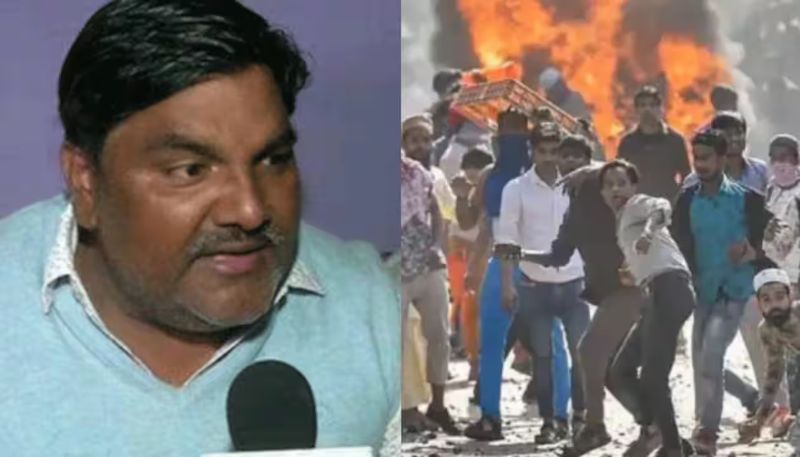
Court finds ex-AAP Councillor Tahir Hussain directly involved in 2020 Delhi communal riots during Donald Trump’s visit
Three years have passed since the devastating 2020 Delhi riots, and the wounds inflicted during those four fateful days from February 23 to 27 continue to haunt the city. The violence, which resulted in the deaths of 53 people (38 Muslim victims and 15 Hindus) and left hundreds injured, has left a lasting impact on the community.
In a significant development concerning the pursuit of justice, Delhi’s Karkardooma Court has framed murder charges against former Aam Aadmi Party (AAP) councillor Tahir Hussain and 10 others. The charges are in connection with the murder of Intelligence Bureau official Ankit Sharma, a tragic incident that became a symbol of the brutality witnessed during the riots. The framing of charges marks a crucial step towards holding those responsible accountable for their actions.
The court’s actions provide hope for justice-seeking individuals who are still grappling with the aftermath of the riots. It demonstrates the commitment of law enforcement agencies, prosecutors, and the judicial system to ensure that the perpetrators of violence face the consequences of their crimes. The legal proceedings send a powerful message that acts of communal violence will not go unpunished and serve as a deterrent against future incidents.
However, it is essential to recognize that true healing and reconciliation extend beyond courtroom verdicts. Rebuilding trust, promoting inter-community dialogue, and fostering understanding are vital components of the recovery process. It is crucial for all segments of society to unite in bridging divides and creating an environment that upholds the principles of peace, harmony, and respect for all.
The scars of the 2020 Delhi riots serve as a poignant reminder of the significance of safeguarding communal harmony and nurturing a society that embraces diversity and pluralism. Efforts must persist in promoting unity, empathy, and tolerance, while ensuring that the victims of the riots receive the necessary support to rebuild their lives.
As the city reflects on the solemn anniversary, it is a collective responsibility to learn from the past and strive towards a future where such acts of violence are prevented, and the spirit of inclusivity prevails. Delhi must commit to justice, empathy, and mutual understanding, forging a society where every citizen feels safe, respected, and valued. Only through these efforts can the wounds inflicted by the 2020 Delhi riots begin to heal.
Robbery:
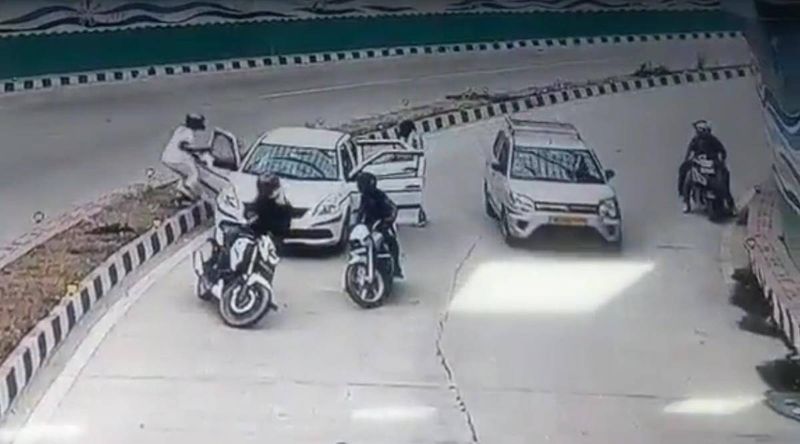
Caught on camera: Daylight robbery at Pragati Maidan, Delhi
Two suspects detained in connection with a daring robbery inside the Pragati Maidan Tunnel signify the significant progress made by the Delhi Police in their investigation. The incident, which occurred two days ago, involved the alleged gunpoint robbery of two individuals who lost Rs 2 lakh in the process.
In response to the incident, the Delhi Police swiftly implemented enhanced security measures at the tunnel’s exit and entry points, aiming to bolster safety and surveillance. Police officials confirmed the deployment of three personnel, including one on a police patrol bike.
CCTV footage of the robbery, which emerged on Monday, revealed the meticulous modus operandi employed by the perpetrators. The footage captured three motorcycles, each carrying two individuals, strategically surrounding a white Maruti Swift Dzire vehicle. One of the assailants dismounted his motorcycle, brandished a firearm, and took the driver hostage by occupying the driver’s seat. Simultaneously, another robber swiftly entered the rear seat of the vehicle and snatched the bag containing the cash.
Law enforcement officials suspect that the robbers had insider information regarding the cash transportation, evident from their awareness of the specific timing and location of the victim’s journey. The use of helmets by all the accused further complicates their identification. Nevertheless, the police managed to trace the number plates of the motorcycles involved, leading them to suspect the involvement of insiders in the robbery.
The ongoing investigation includes questioning the employees of the complainant’s firm and analyzing call detail records to establish potential connections to the crime. Meanwhile, the two suspects detained in Burari are currently being interrogated to determine their involvement in the robbery.
Further revelations indicate that the accused utilized stolen Apache motorcycles and employed stolen number plates from the same model—a tactic aimed at hindering identification and evading law enforcement. The search for the remaining individuals involved in the robbery is currently underway. Authorities have scrutinized more than 300 CCTV cameras, successfully identifying the suspects who are believed to be in their 20s. Their last known location was observed in Majnu ka Tilla before they were seen fleeing towards Outer Delhi. There are suspicions that the culprits may have escaped the city entirely.
These recent incidents, along with the detention of the two suspects and reinforced security measures at the Pragati Maidan Tunnel, highlight the urgency for the Delhi Police to apprehend those responsible. Unfortunately, such incidents contribute to the growing perception that Delhi has become an unsafe place due to an increase in daylight crimes.
In a separate incident, the Delhi Police announced the successful apprehension of a robber who attempted to rob an individual in the Sarai Rohilla area of the national capital. The accused, Shahnawaz Hussain, an 18-year-old with a history of involvement in various criminal cases as a juvenile, was taken into custody following a complaint filed by the victim. The incident occurred on March 13 at around 4:20 PM, when the victim visited a nearby public toilet and was unexpectedly attacked from behind. The robber forcefully snatched the victim’s black-colored purse, containing Rs. 800 in cash and his Aadhaar card, before making a swift escape.
In response to the complaint, the authorities registered a case under Section 392 of the Indian Penal Code (IPC) at PS Sarai Rohilla, launching a thorough investigation into the matter.
Shahnawaz Hussain’s arrest underscores the significance of proactive law enforcement efforts to combat crime. His prior involvement in criminal activities as a juvenile emphasizes the importance of rehabilitation and the prevention of recidivism among young offenders.
The Delhi Police remain steadfast in their commitment to thoroughly investigate the incident, gather evidence, and ensure that justice is served. These actions convey a resolute message that criminal activities will not go unpunished. The safety and security of residents in Sarai Rohilla and across the city are of utmost importance to the authorities.
Anti-India movements:
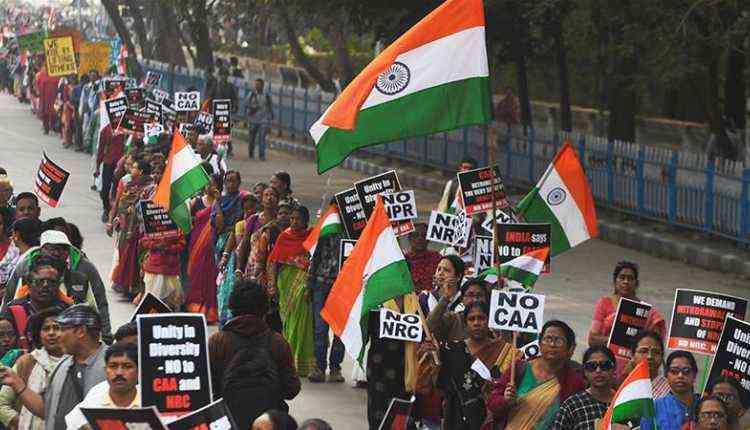
Protest against CAA as an alleged anti-India move funded by PFI and foreign organizations
The Delhi Police confirmed on Tuesday that they have arrested four individuals allegedly linked to the extremist group Popular Front of India (PFI) in Delhi’s Shaheen Bagh area. The arrests were made under the Unlawful Activities Prevention Act (UAPA). This comes just days after the central government formally banned PFI and eight of its subsidiaries for the next five years in a major crackdown on anti-national organizations. Notably, this marks the first PFI-related arrest made by the police in the national capital.
IPC Sections 120 B, 153 A, and Section 10 UAPA Invoked
Delhi’s Patiala House Court has remanded all four accused PFI members in police custody for three days. A senior Delhi police official has confirmed that the arrested members are facing charges under IPC sections 120 B (criminal conspiracy) and 153 A (promoting enmity between different groups). Additionally, the case includes the invocation of Section 10 of the Unlawful Activities (Prevention) Act (UAPA). These sections emphasize the seriousness of the charges and the gravity of the alleged offenses against the accused.
Accused Conspired to Disrupt Public Order Despite Ban
According to the police, the arrested individuals had conspired to disrupt public order and target the government, even after the ban on PFI’s activities. The Delhi Police received specific inputs indicating that addresses in Shaheen Bagh, Abdul Fazal Enclave, and Jamia Nagar were being used for carrying out unlawful activities of the PFI and its associates. The FIR registered against the accused states that the leaders, members, and associates of the banned organization were conspiring to promote communal enmity and mobilize supporters to incite violence at various places of worship.
Background: Ban on PFI and Affiliated Organizations
On September 29, the Union Home Ministry announced a formal ban on the extremist outfit Popular Front of India (PFI). The ban was imposed due to its alleged links with Islamic terrorist groups such as ISIS, Students Islamic Movement of India, and Jamat-ul-Mujahideen Bangladesh. Along with PFI, the affiliated organizations, including Rehab India Foundation (RIF), Campus Front of India (CF), All India Imams Council (AIIC), National Confederation of Human Rights Organisation (NCHRO), National Women’s Front, Junior Front, Empower India Foundation, and Rehab Foundation, Kerala, were also banned under the UAPA.
These recent arrests and the subsequent investigation highlight the government’s commitment to maintaining national security and addressing activities that pose a threat to public order and communal harmony.
Dacoities:
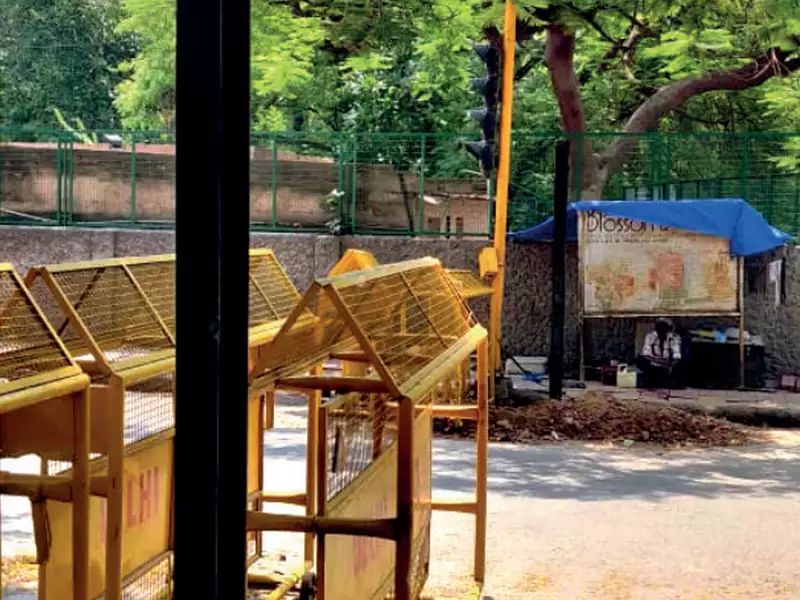
Security concerns: Incidents of dacoities raise alarm in Delhi
Unidentified burglars targeted a house in Delhi’s upscale Greater Kailash-2 area, breaking into the premises and stealing items worth over Rs 3 lakhs. Security cameras at the building captured the shocking incident, revealing the burglars cutting open the balcony grill to gain access to the house in one of the city’s most posh neighborhoods.
The robbery occurred on May 28 in an upscale society in Greater Kailash-2. The burglars swiftly entered the house, stole items worth more than Rs 3 lakhs, and made their escape within a span of 30 minutes.
Additional footage from a nearby CCTV camera depicted the burglars using a cutter to slice through the wooden grill and gain entry through a different gate. Two of the robbers were seen bringing the stolen items, including an iPad and a laptop, and placing them into their bag while the third accomplice kept a lookout.
During the robbery, the residents were asleep and completely unaware of the criminal activity taking place within their own home. The burglars managed to escape with cash, jewelry, an iPad, a laptop, and other valuables without arousing any suspicion from security guards or neighbors.
The stealthy nature of the burglary meant that neither the security guards nor the neighbors were alerted to the crime. As a result, the Delhi Police did not receive any information until the next morning when the residents discovered the break-in and reported the incident to the Chitranjan Park police department.
Upon realizing that their house had been robbed, the homeowners promptly filed a complaint at the Chitranjan Park police department. Authorities have registered a case and are currently investigating how the break-in occurred in an upscale neighborhood like Greater Kailash-2.
Meanwhile, the Delhi Police are actively working to gather leads and apprehend the culprits responsible for the burglary. Their primary objective is to ensure the safety and security of residents in the area.
In an unrelated incident dating back to 2008, a court has sentenced four individuals to eight years in jail for attempting to commit dacoity at a transport firm godown. The court emphasized the need for stern punishment to safeguard citizens’ safety and protect life, liberty, and property.
The convicted individuals, namely Amzad Khan, Imran, Sheikh Sharafat, and Sanwar, were armed with weapons during their attempted robbery in 2008. The court’s decision sends a strong message against such criminal activities and underscores the importance of maintaining the well-being of individuals in the city.
Snatching:
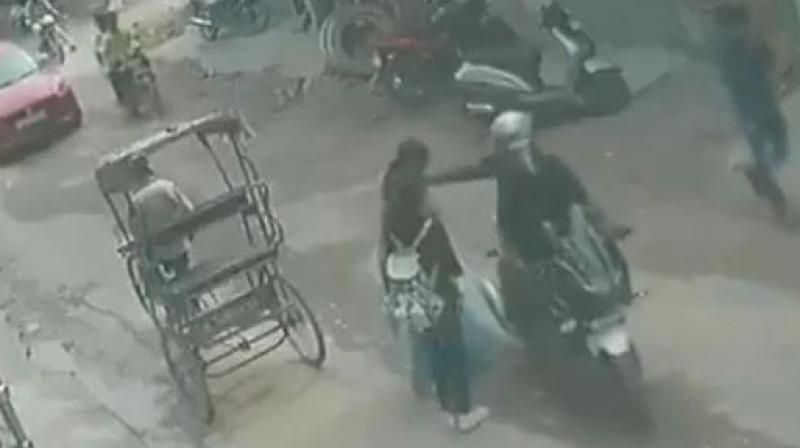
Increasing menace: Rising incidents of snatching create fear among residents of Delhi
According to a report published by Business Standard, the streets of Delhi experienced more than 5,000 cases of robbery during the first six months of 2022. This alarming data highlights the pervasive issue of street crime in the city and the need for heightened security measures.
In a tragic incident reported by the Times of India on October 28, 2022, a 57-year-old woman named Sumitra Mittal lost her life when three men on a scooter targeted her in Rohini, Delhi. While she was traveling in a moving e-rickshaw, the assailants snatched her purse, causing her to fall off and sustain severe head injuries. Despite being rushed to the hospital, Sumitra tragically succumbed to her injuries. The swift response of the police led to the arrest of the snatchers within 24 hours. During the apprehension, the authorities managed to recover some of the stolen belongings. The arrested individuals, identified as Raju, Rahul, and Rohan, are between the ages of 18 and 22. It is worth noting that Sumitra had already endured significant personal tragedies, having lost her husband several years ago, as well as both her sons at young ages to stroke and heart attacks.
In another distressing incident, it has come to light that a criminal named Anish embarked on a crime spree, showcasing his audacity and violence. After stabbing Assistant Sub-Inspector (ASI) Shambhu Dayal, Anish attempted to flee by forcefully snatching a bike using a knife. Failing in his endeavor, he sought refuge in a nearby building. Inside, he took a man hostage, holding a knife to his neck, intensifying the fear and danger faced by the innocent victim. The shocking incident has sent shockwaves throughout the community, emphasizing the urgent need for enhanced security measures and prompt law enforcement actions to ensure the safety and well-being of Delhi’s residents.
These incidents shed light on the pressing issue of rising crime rates in Delhi. The local authorities must prioritize comprehensive security strategies and law enforcement efforts to combat street crimes effectively and safeguard the lives and belongings of the city’s inhabitants.
Pickpocketing:
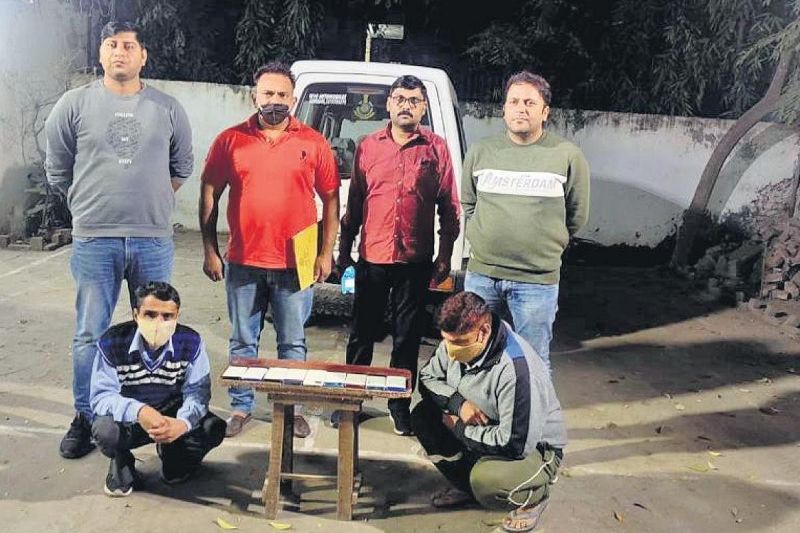
Stealthy fingers at work: Pickpocketing incidents on the rise in Delhi’s crowded streets
According to a report published by The Times of India, women comprised a significant majority, with 94% of pickpockets apprehended in Delhi Metro trains. In 2017, a total of 1,392 pickpocketing cases were reported, prompting the Central Industrial Security Force (CISF) to take drastic measures to reduce the incidents. Their efforts resulted in a decrease in reported cases to 497 in 2018, with women being responsible for the majority of offenses at 94%, compared to 85% in the previous year.
In another incident, during a Wednesday noon commute to college, two pickpockets allegedly stabbed a 23-year-old BEd student from Jamia Millia Islamia inside a cluster bus. The victim, Mohd Asad Shah, and his friend resisted the pickpocketing attempt by the accused, who then attacked Shah with a blade and fled. Police reported that Shah sustained stab wounds to his abdomen and hands and sent to AIIMS Trauma Centre for receiving treatment.
In an unrelated incident, A group of pickpockets dragged a man named Amarjeet out of a Delhi Transport Corporation (DTC) bus and fatally stabbed him near Pragati Maidan. The incident occurred on Sunday evening when the gang targeted Amarjeet for resisting their pickpocketing attempt. Amarjeet, accompanied by his wife, brother, and minor son, was returning home after visiting the Delhi Zoo. The attackers fled the scene after the stabbing, but Amarjeet’s wife bravely pursued and apprehended them.
In the similar incident, the police successfully arrested four members of an organized gang of pickpockets who targeted passengers on Delhi Transport Corporation (DTC) buses in south Delhi. The operation led to the recovery of 108 stolen mobile phones. The gang had been active for less than three months, primarily operating on Mathura Road between Ashram Chowk and Badarpur. The members referred to themselves as a “company” and utilized unique code names while assigning specific tasks. Authorities are currently conducting further investigations to apprehend additional members associated with the gang.
These incidents highlighted the escalating prevalence of pickpocketing in Delhi, shedding light on the involvement of women perpetrators and organized criminal networks. It is imperative for authorities to address these challenges through comprehensive strategies to ensure the safety and security of Delhi’s residents.
Public indecency:
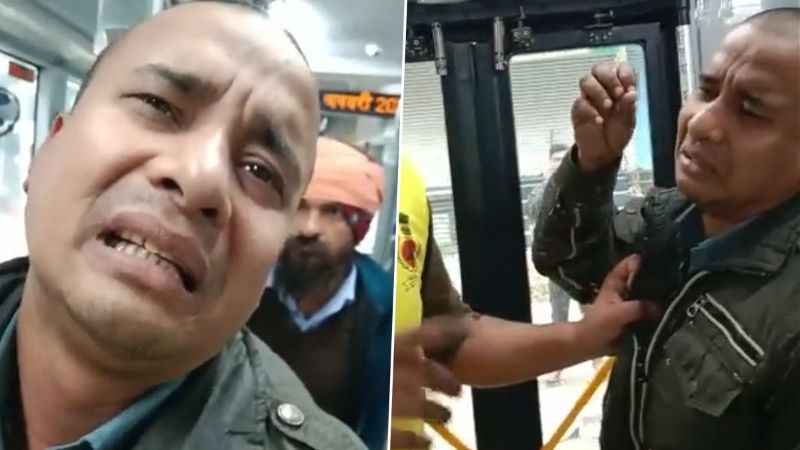
Caught in the act: Man apprehended for public indecency on a DTC public bus in Delhi
A middle-aged man allegedly engaged in masturbating and persistently attempted to touch the waist of a female student in a moving bus. The incident unfolded on February 7 along the route between Vasant Village and IIT Gate, as reported by a student from Delhi University (DU). The victim, with great courage, shouted at the accused, but he remained oblivious to the gravity of his actions. Shockingly, the co-passengers chose to ignore the distressing situation, further compounding the victim’s ordeal. Taking matters into her own hands, the DU student recorded the incident and uploaded a video online, exposing the man’s lewd behavior for the world to see.
In another incident, A video capturing an appalling incident has gone viral, wherein a man allegedly engaged in “masturbating” in front of a girl inside a bus in Delhi‘s Rohini area. The distressing incident unfolded on Tuesday and came to light when a vigilant DTC marshal, Sandeep Chakara, who happened to be present on the bus, took immediate action. Upon the girl raising an alarm, the marshal swiftly apprehended the accused. The accused, identified as a resident of Bihar, was handed over to the police. However, due to the absence of a formal complaint, the accused was not immediately arrested. Authorities initiated an inquiry, led by Sub-Inspector Suman from the North Rohini Police Station, after being informed about the incident on Wednesday.
These deeply troubling incidents shed light on the pervasive issue of sexual harassment and misconduct in public spaces. It underscores the urgent need for robust safety measures and comprehensive awareness campaigns to protect individuals, particularly women, from such reprehensible behavior. It is imperative that authorities take swift and decisive action to address these concerns and ensure the safety and well-being of all commuters and citizens.
Forced marriages:
Three individuals have been arrested by the police in Delhi for their involvement in the alleged kidnapping and forced marriage of a 15-year-old girl in Tigri Extension. The incident came to the attention of the police on August 8, 2021, when they received information about the girl’s abduction from the Kalkaji area. Additional Deputy Commissioner of Police (South-East) Surendra Choudhary stated that the victim’s family, who hailed from Ajmer in Rajasthan, led a nomadic lifestyle and resided on a footpath in Nehru Place.
Choudhary further revealed that on January 10, the girl’s parents informed the police that their missing daughter had contacted them, stating that she was in the Tigri Extension area. In response, SHO (Kalkaji) Balbir Singh formed a dedicated team. Through a thorough investigation, the team traced the girl’s phone activity to the C-block area of Tigri Extension. Following extensive door-to-door verification, the police successfully located the victim in the said area.
In a separate incident, a 20-year-old woman residing in Sarita Vihar, Southeast Delhi, has accused a man, known initially as Rahul but later identified as Sahib Ali, of concealing his true identity and coercing her into marriage. The woman lodged a complaint against the 20-year-old youth at the Sarita Vihar police station. She stated that Ali, who had taken up residence in her house as a tenant, posed as Rahul when they first met.
According to the woman, in November 2019, Ali proposed marriage to her. Initially, he claimed to be without a family, but later he introduced her to his parents and other relatives. It was then that she discovered his real name as Sahib Ali and his Muslim background. The couple got married at Kalka Mandir, with Ali assuring her that he would not pressure her to convert to his religion or follow his customs. However, over time, he allegedly subjected her to physical abuse and forced her into non-consensual physical relations against her wishes.
Furthermore, the woman accused Hazisunnala, Ali’s father, of inappropriately touching her and attempting to sexually assault her. The police have registered a case under the relevant provisions of the Indian Penal Code, but no arrests have been made as of yet.
These distressing incidents highlight the urgent need for increased vigilance, stricter legal measures, and comprehensive awareness campaigns to combat forced marriages, protect minors, and ensure the safety and well-being of individuals in society.
Illegal and forced religious conversions:
The Gautam Buddh Nagar police in Delhi have arrested a 30-year-old man, Intezar, for allegedly raping a woman and attempting to forcibly convert her religion. They have also charged his father, Abbas Ali (52), and brother, Suhail (24), under provisions of the Uttar Pradesh Prohibition of Unlawful Conversion of Religion Act. ADCP (Central) Saad Miya Khan stated that the victim had met Intezar at a local gym, where he introduced himself as Sonu. The woman filed a complaint, accusing him of raping her.
According to the woman’s complaint, after getting to know Intezar as Sonu, she visited his flat, where he allegedly drugged her and raped her. She started working at a gym owned by Intezar, believing his promise to marry her. However, she later overheard a phone conversation revealing his real name as Intezar. An argument ensued, during which she claimed to have been physically assaulted. She further accused Intezar’s brother and father of attempting to convert her to a different religion. The police have filed an FIR under various sections of the Indian Penal Code, including those related to rape, assault, and conspiracy, as well as provisions of the Uttar Pradesh Prohibition of Unlawful Conversion of Religion Act.
In another incident, authorities have summoned former minister Rajendra Pal Gautam for questioning regarding a mass religious conversion event that took place in Delhi on October 5. Gautam, who belongs to the ruling Aam Aadmi Party (AAP), underwent questioning at his residence and subsequently resigned as the social welfare minister amidst controversy surrounding the event. Thousands of Hindus reportedly converted to Buddhism during the gathering. A circulated video shows Gautam signing the questioning notice, contradicting his earlier denial of receiving the summons. The notice requires Gautam to appear in person at Delhi’s Paharganj police station with all relevant documents.
The Delhi BJP has labeled the brutal murder of a 16-year-old girl in Rohini area as a case of “love jihad,” attributing it to a well-organized group. “Love jihad” refers to an alleged strategy by Muslim men to convert Hindu women to Islam through marriage. Delhi BJP president Virendra Sachdeva accused the Aam Aadmi Party of downplaying the incident, emphasizing that it was not an ordinary murder but a result of “love jihad.” Sachdeva claimed that the arrested suspect, Sahil Sarfaraz, wore a red Kalawa (sacred thread), indicating his affiliation with a love jihad gang operating systematically. While the police have apprehended the accused, tensions persist, with the Delhi Chief Minister, Arvind Kejriwal, urging the Lieutenant Governor to take action to address the deteriorating law and order situation in the city.
These incidents have sparked discussions and debates among residents, with the topics of love jihad, the Shraddha Walker murder case, and related films being widely discussed in Delhi’s Rohini area. The shocking murder, captured on camera and circulated on social media, has raised concerns about public safety and the prevalence of such incidents.
Conclusion:
Despite its status as the capital city of India, Delhi continues to grapple with significant safety issues, raising concerns about the well-being of its residents. Recent news articles highlighting various incidents emphasize the ongoing challenges faced by the city in terms of maintaining a safe environment.
Instances of rape, forced religious conversion, and brutal murders, as reported in the news, illustrate the prevalence of social issues that contribute to the city’s lack of safety. These incidents reflect the urgent need to address and overcome deep-rooted problems in Delhi’s society.
One of the key factors behind the city’s safety concerns is the persistence of crimes such as rape and sexual assault. Despite efforts to improve law enforcement and enact stricter laws, instances of sexual violence against women and minors persist at an alarming rate, casting doubts on the effectiveness of existing preventive measures.
Moreover, the controversial issue of “love jihad” has created tensions in Delhi, with allegations of forced religious conversions and communal strife. These incidents further perpetuate the perception of an unsafe environment, where individuals are susceptible to threats based on their religious or cultural backgrounds.
In addition, Delhi’s crowded and diverse population poses challenges for law enforcement agencies. The sheer size of the population, combined with socioeconomic disparities, creates hurdles in ensuring efficient surveillance, swift response times, and comprehensive security measures throughout the city.
While the government and law enforcement agencies have taken steps to address these concerns, more sustained efforts are required to improve the safety situation in Delhi. It is crucial to enhance the capacity of law enforcement, foster community engagement, and implement effective preventive measures to create a safer environment for all residents and visitors.
Delhi’s safety challenges, despite its status as the capital city, necessitate comprehensive and sustained efforts to address underlying social issues, strengthen law enforcement capabilities, and prioritize the well-being and security of its residents. Achieving a safer Delhi requires collective action and a holistic approach to create a conducive environment for all individuals within the city.


